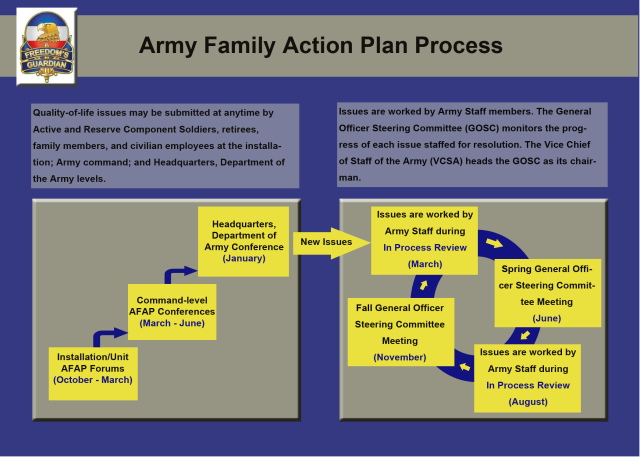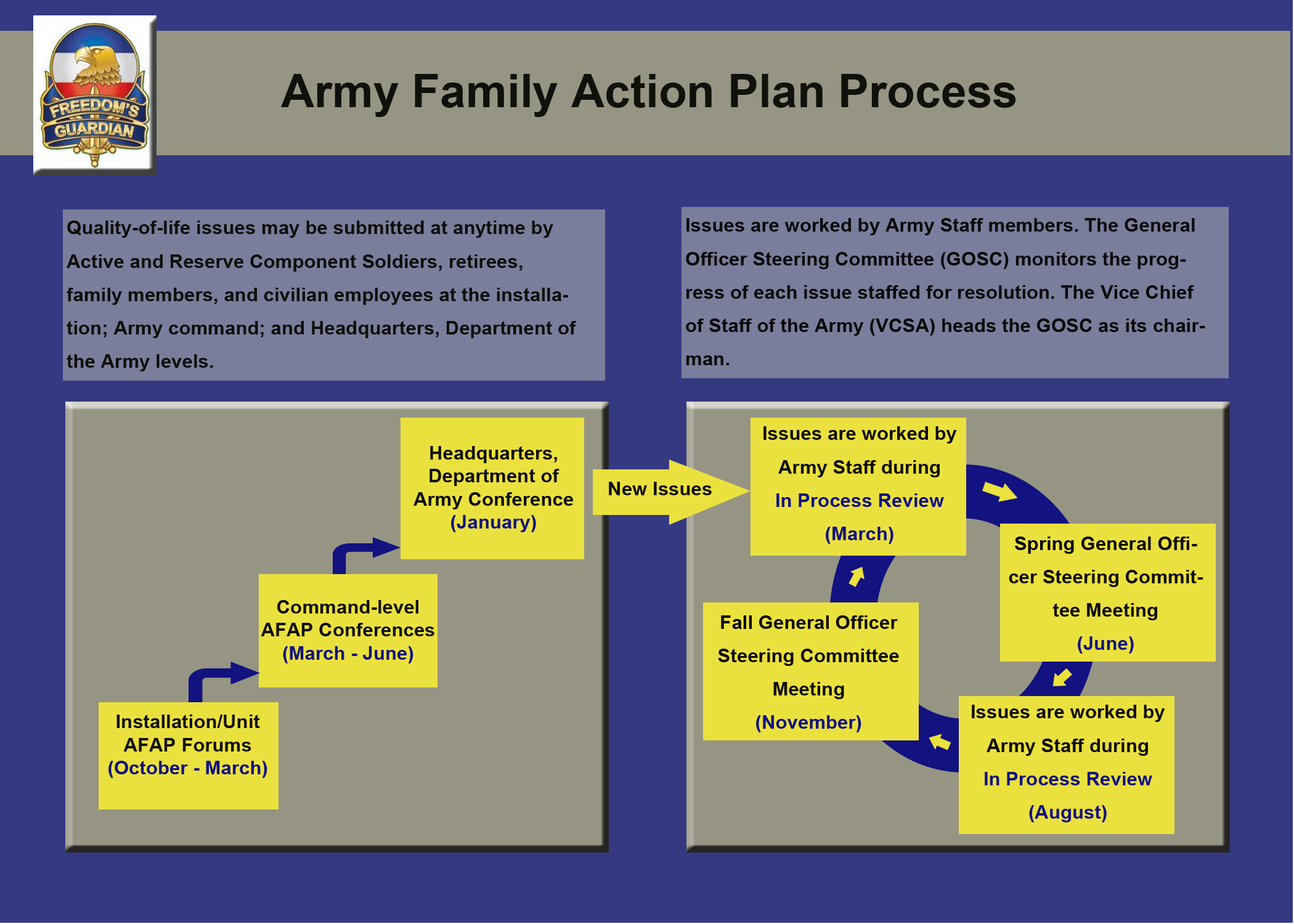FORT McPHERSON, Ga. (Feb. 2, 2010) - In early January, 96 Department of the Army delegates from across the nation selected 16 of 82 pending quality-of-life issues to resolve through the Army Family Action Plan Process.
Among the delegates gathered at this year's DA-level Army Family Action Plan (AFAP) conference in Washington, D.C., were three representatives from U.S. Army Forces Command: BG Eric Porter, FORSCOM G-1; Sgt. Maj. Scarlett Williams, FORSCOM G-1 SGM; and Mrs. Pamela McBride, FORSCOM G-1 Well Being Program Specialist.
The AFAP process is the principal Army program Army leaders use to enhance the quality of life for Soldiers and their Family members. The delegates who attended the DA-level conference represented the entire Army Family - Active and Reserve Component Soldiers, leaders, Family members, retirees and DA civilians.
"The Army Family Action Plan has been a part of the Army for more than 25 years, and (it) is an extremely effective way for every voice in the Army Family to be heard," said Porter. "Through the AFAP process, anyone is welcome to submit issues and make recommendations for resolution."
Past issues resolved through the AFAP process have resulted in policy changes such as the new Post-9/11 GI Bill education benefits, which now may be transferred from Soldiers to their spouse or children; and now, dependants of Active duty Soldiers may also receive in-state tuition at public colleges and universities in the states where they reside or where they are permanently stationed, Porter said.
During the conference, delegates were organized into eight working groups to review the identified 82 quality-of-life issues. Each group was tasked to prioritize two issues. Once the working group sessions ended, the 16 prioritized issues were briefed to Army leadership.
Following are the issues that were selected, ranked as the leading priorities at this year's conference. Two of the 16 prioritized issues, items 6 and 10, were generated through FORSCOM:
1. Monthly Stipend to Ill/Injured Soldiers for Non-Medical Caregivers
2. Funding Service Dogs for Wounded Warriors
3. Behavioral Health Services Shortages
4. Family Readiness Group External Fundraising Restrictions
5. Exceptional Family Member Program Enrollment Eligibility for Reserve Component Soldiers
6. Standard Level of Security Measures in Barracks (FORSCOM)
7. Availability of 24/7 Child Care with Child and Youth Services Delivery Systems
8. Reserve Component Inactive Duty for Training Travel and Transportation Allowances
9. Reduced Eligibility Age for Retirement of Reserve Component Soldiers Mobilized in
Support of overseas contingency operations
10. Extended Transitional Survivor Spouses' TRICARE Medical Coverage (FORSCOM)
11. Active Duty Family Members Prescription Cost Share Inequitability
12. Supplemental Mission Funds for Reserve Component Family Readiness Groups
13. Compensatory Time for DA Civilians
14. Reserve Component Government Employees' and their Family Members' access to
TRICARE Reserve Select
15. TRICARE Allowable Charge Reimbursement of Upgraded/Deluxe Durable Medical Equipment
16. Standardization of Privatized Housing Application Process.
These 16 issues are now in the resolution-development phase of the AFAP process. This means the General Officer Steering Committee (GOSC) will monitor the progress of each issue on the list. The Vice Chief of Staff of the Army (VCSA) heads the GOSC as its chairman and receives updates twice yearly on selected actions for issues currently being worked. At this point in the process, the VCSA determines whether an issue has been completed, is unattainable or still needs continued work.
"What is amazing is that an issue submitted to an installation AFAP program could potentially move through mid-level and HQDA levels and gain national visibility," Porter said. "In fact, (since AFAP began 25 years ago) 112 of the 651 issues that have entered the Headquarters, Department of the Army AFAP process have resulted in legislative changes; and 159 issues have resulted in the establishment of Department of Defense or Army policies."
FORSCOM Well-Being officials will track the 16 prioritized issues along with all other active issues in the AFAP Process and inform FORSCOM senior leadership of any changes to their status.
An important thing to remember about AFAP is that it continues all year. For example, as the current prioritized list of 16 issues from the DA-level conference continue to work their way through the process, new issues may continue to be introduced at any level of command throughout the Army worldwide.
FORSCOM will host its command-wide AFAP conference March 23-26 at Fort McPherson, Ga. About 56 delegates from FORSCOM units nationwide are expected to attend. During the conference, FORSCOM G1 officials will provide a status update to delegates of previously identified quality-of-life issues and then facilitate the command-level process for the prioritization of current issues.
For more information about the Army Family Action Plan process, contact your local AFAP program manger through the post Army Community Service Program or contact Mrs. Pamela McBride, FORSCOM Well-Being specialist at Pamela.mcbride@us.army.mil.


Social Sharing